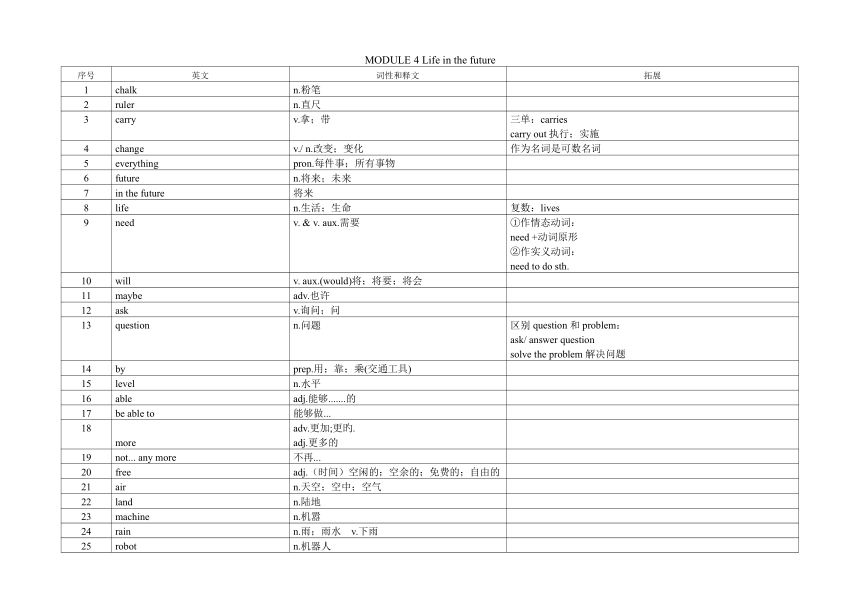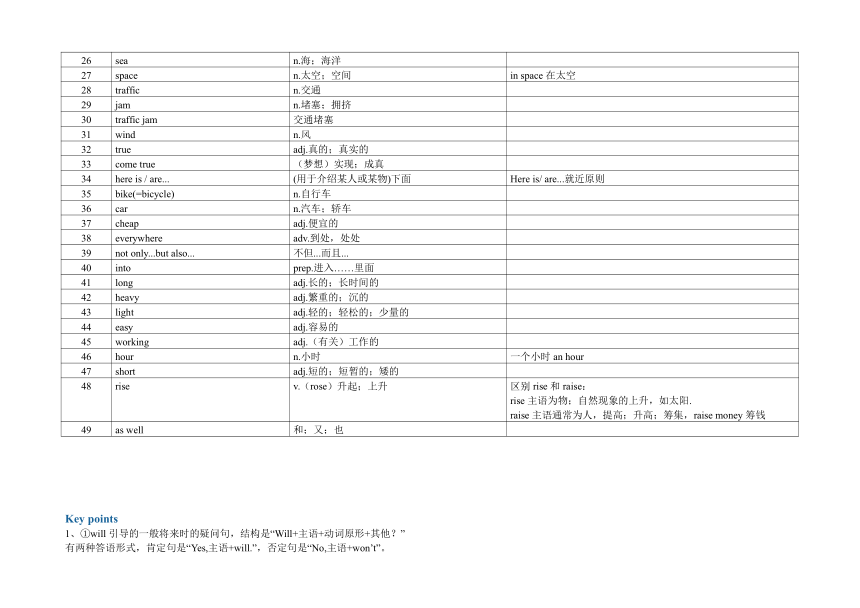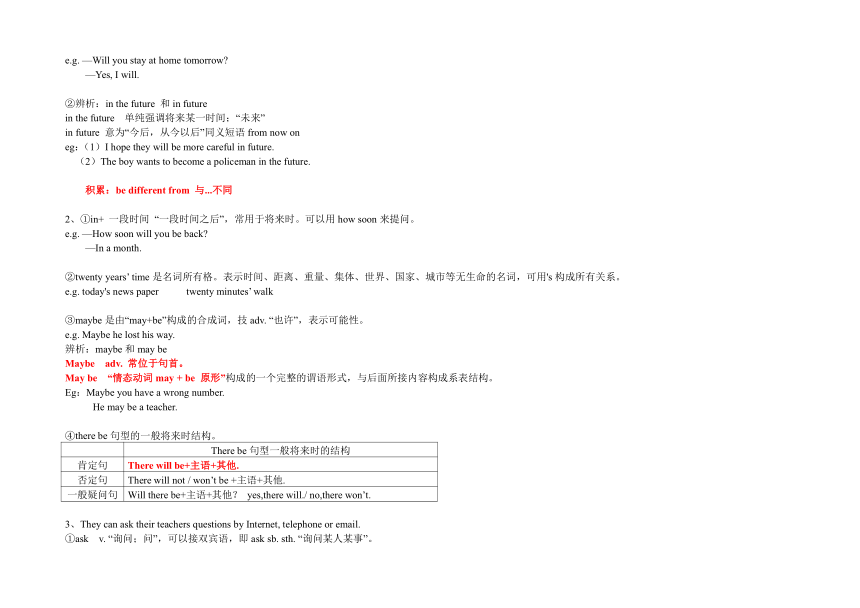外研版七年级英语下册Module4Life in the future讲义
文档属性
| 名称 | 外研版七年级英语下册Module4Life in the future讲义 |

|
|
| 格式 | zip | ||
| 文件大小 | 67.9KB | ||
| 资源类型 | 教案 | ||
| 版本资源 | 外研版 | ||
| 科目 | 英语 | ||
| 更新时间 | 2022-02-19 00:00:00 | ||
图片预览



文档简介
MODULE 4 Life in the future
序号 英文 词性和释文 拓展
1 chalk n.粉笔
2 ruler n.直尺
3 carry v.拿;带 三单:carries carry out执行;实施
4 change v./ n.改变;变化 作为名词是可数名词
5 everything pron.每件事;所有事物
6 future n.将来;未来
7 in the future 将来
8 life n.生活;生命 复数:lives
9 need v. & v. aux.需要 ①作情态动词: need +动词原形 ②作实义动词: need to do sth.
10 will v. aux.(would)将;将要;将会
11 maybe adv.也许
12 ask v.询问;问
13 question n.问题 区别question和problem: ask/ answer question solve the problem解决问题
14 by prep.用;靠;乘(交通工具)
15 level n.水平
16 able adj.能够.......的
17 be able to 能够做...
18 more adv.更加;更旳. adj.更多的
19 not... any more 不再...
20 free adj.(时间)空闲的;空余的;免费的;自由的
21 air n.天空;空中;空气
22 land n.陆地
23 machine n.机嚣
24 rain n.雨;雨水 v.下雨
25 robot n.机器人
26 sea n.海;海洋
27 space n.太空;空间 in space在太空
28 traffic n.交通
29 jam n.堵塞;拥挤
30 traffic jam 交通堵塞
31 wind n.风
32 true adj.真的;真实的
33 come true (梦想)实现;成真
34 here is / are... (用于介绍某人或某物)下面 Here is/ are...就近原则
35 bike(=bicycle) n.自行车
36 car n.汽车;轿车
37 cheap adj.便宜的
38 everywhere adv.到处,处处
39 not only...but also... 不但...而且...
40 into prep.进入……里面
41 long adj.长的;长时间的
42 heavy adj.繁重的;沉的
43 light adj.轻的;轻松的;少量的
44 easy adj.容易的
45 working adj.(有关)工作的
46 hour n.小时 一个小时an hour
47 short adj.短的;短暂的;矮的
48 rise v.(rose)升起;上升 区别rise和raise: rise主语为物;自然现象的上升,如太阳. raise主语通常为人,提高;升高;筹集,raise money筹钱
49 as well 和;又;也
Key points
1、①will引导的一般将来时的疑问句,结构是“Will+主语+动词原形+其他?”
有两种答语形式,肯定句是“Yes,主语+will.”,否定句是“No,主语+won’t”。
e.g. —Will you stay at home tomorrow
—Yes, I will.
②辨析:in the future 和in future
in the future 单纯强调将来某一时间;“未来”
in future 意为“今后,从今以后”同义短语from now on
eg:(1)I hope they will be more careful in future.
The boy wants to become a policeman in the future.
积累:be different from 与...不同
2、①in+ 一段时间 “一段时间之后”,常用于将来时。可以用how soon来提问。
e.g. —How soon will you be back
—In a month.
②twenty years’ time是名词所有格。表示时间、距离、重量、集体、世界、国家、城市等无生命的名词,可用's构成所有关系。
e.g. today's news paper twenty minutes’ walk
③maybe是由“may+be”构成的合成词,技adv. “也许”,表示可能性。
e.g. Maybe he lost his way.
辨析:maybe和may be
Maybe adv. 常位于句首。
May be “情态动词may + be 原形”构成的一个完整的谓语形式,与后面所接内容构成系表结构。
Eg:Maybe you have a wrong number.
He may be a teacher.
④there be句型的一般将来时结构。
There be句型一般将来时的结构
肯定句 There will be+主语+其他.
否定句 There will not / won’t be +主语+其他.
一般疑问句 Will there be+主语+其他? yes,there will./ no,there won’t.
3、They can ask their teachers questions by Internet, telephone or email.
①ask v. “询问;问”,可以接双宾语,即ask sb. sth. “询问某人某事”。
e.g. He asked me a question, but I didn't answer.
拓展:
Ask for sth. 请求;恳求(给予)某物 寻求帮助ask for help
Eg:Many students ask for advice about learning English.
(2)ask sb. (not) to do sth. 要求某人(不要)做某事
Eg:He asks me not to go swimming.
②by Internet “通过网络;用网络” ;
by prep.“通过;用;靠(某种方式)” +名词/代词/动名词。
by doing sth. 通过在做某事
e.g. (1)by telephone by email
(2)He learns English by listening to tapes.
4、be able to do “能够做...”,相当于 can。
注意:can只有could和原形两种形式,be able to可用于各种时态。
e.g. They are able to tell you this news soon.他们很快就能告诉你这个消息。
5、not... any more "不再 ”
e.g. Teachers won’t use chalk on a blackboard any more!
辨析:
not..any more 表示程度上或做某事的次数不再增加,相当于no more。一般修饰非延续性动词。 You will not see him any more.=You will see him no more.
not...any longer 表动作、状态或时间上不再延续,相当于no longer。 The old man doesn’t live in the house any longer.=The old man no longer lives in the house.
6、①a lot of 大量;许多。a lot of相当于lots of, 既可修饰可数名词复数(相当于many),也可修饰不可数名词(相当于much)。
e.g. There is a lot of / much / lots of water in the lake.
拓展:a lot = very much
Eg : Thank you very much.= Thanks a lot.
②homework to do该句中的动词不定式作定语,后置,修饰名词homework.
e.g. Every day he has some emails to check.
③free “(时间)空闲的;空余的”
e.g. Are you free tonight
free time 业余时间= spare time
7、like prep. “像”,常与be连用。
e.g. He is like his father.
拓展:
What do/does +某人+look like?
询问某人的外貌特征,答语是描述外贸的句子。
What be +某人+like?
询问某人性格特点,答语是描述性格的句子。
Eg:—What does he look like —He is tall and thin.
—What is you sister like —She is friendly.
What will life be like in the future?
用来询问生活、物品或天气等的情况。
What’s the weather like = How is the weather
询问天气
8、①one num. “(基数)一” n. “一个人;一点钟" pron. “一个人或物”
one可以指代前文提到的人或物。
e.g. This book is much better than that one.
辨析:
it 指代上文提到过的同一事物,“同类同物”。 My umbrella is lost . I think I have to buy a new one. My umbrella is lost. I’m looking for it. I have a new coat and three old ones. This pen doesn’t work. I must buy another one.
one 代替上文出现过的单数可数名词,表泛指,“同类不同物”,前面可有冠词或形容词。
ones 是one的复数形式,表示同类事物中的一些,表泛指。
②come true “(预言,愿望)实现;成为现实”,不及物动词短语,后面不能跟名词。
e.g. Work hard, and your dream will come true.
积累:come on 加油;快点 come out 出版 come over 过来,顺便拜访
9、as well “也;又”,位于肯定句结尾。
e.g. I’m going to London and my sister is going as well.
9、☆辨析:too , also,either,as well
too 肯定句句尾 too前面一般有一个逗号和前面句子隔开
also 肯定句句中 Be动词、情态动词之后,实义动词之前
as well 肯定句句尾 比too更正式一点
either 否定句句尾 用逗号与前句隔开,也可以不隔开
eg:I’m in Row 1, too .
Chinese take-away food is also popular.
We don’t like the same colors, either .
常见否定词:hardly,never
10、①It + be+adj.+to do sth.句型,其中it是形式主语,代替后面的动词不定式,真正的主语是后面的动词不定式。
e.g. It's important to learn English well.
拓展:
It + be+adj.+ of sb. to do sth. 若形容词是描绘不定式行为者的性格、品质的,如kind,polite,clever等,则用of sb.
It + be+adj.+for sb. to do sth. 若形容词仅仅是描绘事物,如important,difficult,hard等,则用for sb.
②not only... but also... “不但...而且...” 在句中连接两个并列成分,其中also可省略。
注意:就近原则
Eg:Not only you but also I am going to visit the museum tomorrow.
一般将来时will
构成:
“will +动词原形",其中will没有人称和数的变化
构成
句式 结构 举例
肯定句 主语+ will +动词原形+(宾语)+其他 I will come to see you tomorrow.
否定句 主语+ will+ not +动词原形+(宾语)+其他 (will not=won't / shall not = shan't) I will not be late next time.
一般疑问句 Will+主语+动词原形+其他? Will you come tonight
特殊疑问句 特殊疑问词+ will +(主语)+动词原形+其他? What will you do this Saturday
序号 英文 词性和释文 拓展
1 chalk n.粉笔
2 ruler n.直尺
3 carry v.拿;带 三单:carries carry out执行;实施
4 change v./ n.改变;变化 作为名词是可数名词
5 everything pron.每件事;所有事物
6 future n.将来;未来
7 in the future 将来
8 life n.生活;生命 复数:lives
9 need v. & v. aux.需要 ①作情态动词: need +动词原形 ②作实义动词: need to do sth.
10 will v. aux.(would)将;将要;将会
11 maybe adv.也许
12 ask v.询问;问
13 question n.问题 区别question和problem: ask/ answer question solve the problem解决问题
14 by prep.用;靠;乘(交通工具)
15 level n.水平
16 able adj.能够.......的
17 be able to 能够做...
18 more adv.更加;更旳. adj.更多的
19 not... any more 不再...
20 free adj.(时间)空闲的;空余的;免费的;自由的
21 air n.天空;空中;空气
22 land n.陆地
23 machine n.机嚣
24 rain n.雨;雨水 v.下雨
25 robot n.机器人
26 sea n.海;海洋
27 space n.太空;空间 in space在太空
28 traffic n.交通
29 jam n.堵塞;拥挤
30 traffic jam 交通堵塞
31 wind n.风
32 true adj.真的;真实的
33 come true (梦想)实现;成真
34 here is / are... (用于介绍某人或某物)下面 Here is/ are...就近原则
35 bike(=bicycle) n.自行车
36 car n.汽车;轿车
37 cheap adj.便宜的
38 everywhere adv.到处,处处
39 not only...but also... 不但...而且...
40 into prep.进入……里面
41 long adj.长的;长时间的
42 heavy adj.繁重的;沉的
43 light adj.轻的;轻松的;少量的
44 easy adj.容易的
45 working adj.(有关)工作的
46 hour n.小时 一个小时an hour
47 short adj.短的;短暂的;矮的
48 rise v.(rose)升起;上升 区别rise和raise: rise主语为物;自然现象的上升,如太阳. raise主语通常为人,提高;升高;筹集,raise money筹钱
49 as well 和;又;也
Key points
1、①will引导的一般将来时的疑问句,结构是“Will+主语+动词原形+其他?”
有两种答语形式,肯定句是“Yes,主语+will.”,否定句是“No,主语+won’t”。
e.g. —Will you stay at home tomorrow
—Yes, I will.
②辨析:in the future 和in future
in the future 单纯强调将来某一时间;“未来”
in future 意为“今后,从今以后”同义短语from now on
eg:(1)I hope they will be more careful in future.
The boy wants to become a policeman in the future.
积累:be different from 与...不同
2、①in+ 一段时间 “一段时间之后”,常用于将来时。可以用how soon来提问。
e.g. —How soon will you be back
—In a month.
②twenty years’ time是名词所有格。表示时间、距离、重量、集体、世界、国家、城市等无生命的名词,可用's构成所有关系。
e.g. today's news paper twenty minutes’ walk
③maybe是由“may+be”构成的合成词,技adv. “也许”,表示可能性。
e.g. Maybe he lost his way.
辨析:maybe和may be
Maybe adv. 常位于句首。
May be “情态动词may + be 原形”构成的一个完整的谓语形式,与后面所接内容构成系表结构。
Eg:Maybe you have a wrong number.
He may be a teacher.
④there be句型的一般将来时结构。
There be句型一般将来时的结构
肯定句 There will be+主语+其他.
否定句 There will not / won’t be +主语+其他.
一般疑问句 Will there be+主语+其他? yes,there will./ no,there won’t.
3、They can ask their teachers questions by Internet, telephone or email.
①ask v. “询问;问”,可以接双宾语,即ask sb. sth. “询问某人某事”。
e.g. He asked me a question, but I didn't answer.
拓展:
Ask for sth. 请求;恳求(给予)某物 寻求帮助ask for help
Eg:Many students ask for advice about learning English.
(2)ask sb. (not) to do sth. 要求某人(不要)做某事
Eg:He asks me not to go swimming.
②by Internet “通过网络;用网络” ;
by prep.“通过;用;靠(某种方式)” +名词/代词/动名词。
by doing sth. 通过在做某事
e.g. (1)by telephone by email
(2)He learns English by listening to tapes.
4、be able to do “能够做...”,相当于 can。
注意:can只有could和原形两种形式,be able to可用于各种时态。
e.g. They are able to tell you this news soon.他们很快就能告诉你这个消息。
5、not... any more "不再 ”
e.g. Teachers won’t use chalk on a blackboard any more!
辨析:
not..any more 表示程度上或做某事的次数不再增加,相当于no more。一般修饰非延续性动词。 You will not see him any more.=You will see him no more.
not...any longer 表动作、状态或时间上不再延续,相当于no longer。 The old man doesn’t live in the house any longer.=The old man no longer lives in the house.
6、①a lot of 大量;许多。a lot of相当于lots of, 既可修饰可数名词复数(相当于many),也可修饰不可数名词(相当于much)。
e.g. There is a lot of / much / lots of water in the lake.
拓展:a lot = very much
Eg : Thank you very much.= Thanks a lot.
②homework to do该句中的动词不定式作定语,后置,修饰名词homework.
e.g. Every day he has some emails to check.
③free “(时间)空闲的;空余的”
e.g. Are you free tonight
free time 业余时间= spare time
7、like prep. “像”,常与be连用。
e.g. He is like his father.
拓展:
What do/does +某人+look like?
询问某人的外貌特征,答语是描述外贸的句子。
What be +某人+like?
询问某人性格特点,答语是描述性格的句子。
Eg:—What does he look like —He is tall and thin.
—What is you sister like —She is friendly.
What will life be like in the future?
用来询问生活、物品或天气等的情况。
What’s the weather like = How is the weather
询问天气
8、①one num. “(基数)一” n. “一个人;一点钟" pron. “一个人或物”
one可以指代前文提到的人或物。
e.g. This book is much better than that one.
辨析:
it 指代上文提到过的同一事物,“同类同物”。 My umbrella is lost . I think I have to buy a new one. My umbrella is lost. I’m looking for it. I have a new coat and three old ones. This pen doesn’t work. I must buy another one.
one 代替上文出现过的单数可数名词,表泛指,“同类不同物”,前面可有冠词或形容词。
ones 是one的复数形式,表示同类事物中的一些,表泛指。
②come true “(预言,愿望)实现;成为现实”,不及物动词短语,后面不能跟名词。
e.g. Work hard, and your dream will come true.
积累:come on 加油;快点 come out 出版 come over 过来,顺便拜访
9、as well “也;又”,位于肯定句结尾。
e.g. I’m going to London and my sister is going as well.
9、☆辨析:too , also,either,as well
too 肯定句句尾 too前面一般有一个逗号和前面句子隔开
also 肯定句句中 Be动词、情态动词之后,实义动词之前
as well 肯定句句尾 比too更正式一点
either 否定句句尾 用逗号与前句隔开,也可以不隔开
eg:I’m in Row 1, too .
Chinese take-away food is also popular.
We don’t like the same colors, either .
常见否定词:hardly,never
10、①It + be+adj.+to do sth.句型,其中it是形式主语,代替后面的动词不定式,真正的主语是后面的动词不定式。
e.g. It's important to learn English well.
拓展:
It + be+adj.+ of sb. to do sth. 若形容词是描绘不定式行为者的性格、品质的,如kind,polite,clever等,则用of sb.
It + be+adj.+for sb. to do sth. 若形容词仅仅是描绘事物,如important,difficult,hard等,则用for sb.
②not only... but also... “不但...而且...” 在句中连接两个并列成分,其中also可省略。
注意:就近原则
Eg:Not only you but also I am going to visit the museum tomorrow.
一般将来时will
构成:
“will +动词原形",其中will没有人称和数的变化
构成
句式 结构 举例
肯定句 主语+ will +动词原形+(宾语)+其他 I will come to see you tomorrow.
否定句 主语+ will+ not +动词原形+(宾语)+其他 (will not=won't / shall not = shan't) I will not be late next time.
一般疑问句 Will+主语+动词原形+其他? Will you come tonight
特殊疑问句 特殊疑问词+ will +(主语)+动词原形+其他? What will you do this Saturday
同课章节目录
- Module 1 Lost and found
- Unit 1 Whose bag is this?
- Unit 2 Are they yours?
- Unit 3 Language in use
- Module 2 What can you do ?
- Unit 1 I can play the piano
- Unit 2 I can run really fast
- Unit 3 Language in use
- Module 3 Making plans
- Unit 1 What are you going to do at the weekends?
- Unit 2 We're going to cheer the players.
- Unit 3 Language in use
- Module 4 Life in the future
- Unit 1 Everyone will study at home
- Unit 2 Every family will have a small plane.
- Unit 3 Language in use
- Module 5 Shopping
- Unit 1 What can I do for you?
- Unit 2 You can buy everything on the Internet
- Unit 3 Language in use
- Module 6 Around town
- Unit 1 Could you tell me how to get to the Nationa
- Unit 2 The London Eye is on your right.
- Unit 3 Language in use
- Revision module A
- Module 7 My past life
- Unit 1 I was born in a small village.
- Unit 2 I was born in Quincy.
- Unit 3 Language in use
- Module 8 Story time
- Unit 1 Once upon a time….
- Unit 2 Goldilocks hurried out of the house.
- Unit 3 Language in use
- Module 9 Life history
- Unit 1 He left school and began work at the age of
- Unit 2 He decided to be an actor.
- Unit 3 Language in use
- Module 10 A holiday journey
- Unit 1 What did you do?
- Unit 2 This morning we took a walk.
- Unit 3 Language in use
- Module 11 Body language
- Unit 1 They touch noses!
- Unit 2 Here are some ways to welcome them.
- Unit 3 Language in use
- Module 12 Western music
- Unit 1 It's so beautiful!
- Unit 2 Vienna is the centre of European classical
- Unit 3 Language in use
- Revision module B
